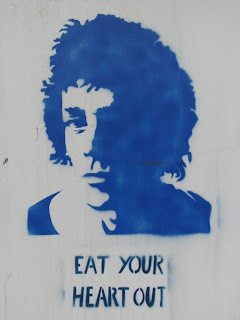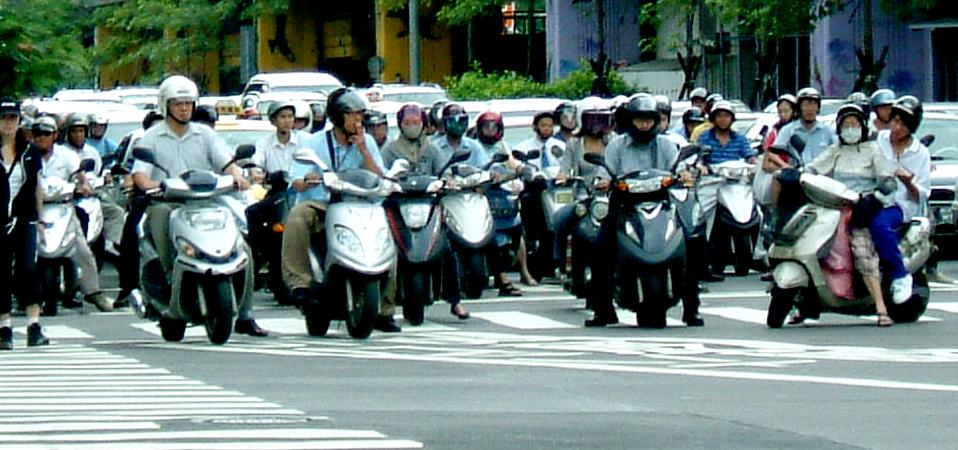 Under-wraps: a plaque that has caused quite a furore.
Under-wraps: a plaque that has caused quite a furore.
Yesterday the Chiang Kai-shek (CKS) Memorial Hall, a tribute to the infamous dictator who maintained martial law in Taiwan for 38 years, was officially renamed the National Taiwan Democracy Memorial Hall (國立台灣民主紀念館). The name change sparked demonstrations at the site as supporters and critics of the name change clashed in minor brawls. Barbed wire fences were erected around the newly christened Democracy Hall and hundreds of police were deployed to quell the unrest. The Sunday edition of the Taipei Times showed the image of an old Taiwanese man with his pants down, apparently proclaiming that President Chen Shui Bian (陳水扁) had no balls. Upon the unveiling of the new plaque President Chen said that the move was a step forward, away from the country's authoritarian past.

When Lisa and I visited the site today there remained a signficant police presence, with a dozen police guarding the entrance to the Hall. The sweeping grounds that encircle the Hall, however, were surprisingly peaceful. It was a cold, wet afternoon in Taipei. Perhaps the rain extinguished some of the controversy surrounding the name change, albeit temporarily. A lone camera-crew from one of Taiwan's news agencies took footage of the lonely square for the evening news. Apparently they were happy that Lisa and I arrived so that at least they'd have some footage for tonight's bulletin. Lisa was asked a few questions but was conscientious not to put her foot in it. Although she did say that it was a good thing without elaborating on her opinion. As she rightly said, this is a Taiwanese issue, a very sensitive issue, and one that foreigners should refrain from putting their large feet in.

A sole reporter finds reprieve in some foreign faces.
We have been asking our Taiwanese friends about the name change in the past few days. Most have been critical of the move, with the more pragmatic denouncing the move as a waste of taxpayer's money (the name change will require the amendment of tourist information and provincial/MRT signage). Some have said that the name change is an ill-fated attempt to change the nation's psyche and that, in the minds of the people, it will always be Chiang Kai-shek Memorial Hall.

The name change is part of a broader campaign by the Democractic People's Party (DPP) to dilute the legacy of Chiang Kai-shek and remove idols of the once-dictator from the Taiwanese landscape. The Chiang Kai-shek International Airport was recently renamed Taoyuan International Airport. In March Kaohsiung Mayor Chen Chu (陳菊) of the DPP issued an administrative order to rename the Chiang Kai-shek Culture Center to the Kaohsiung City Culture Center. The Kaohsiung government also removed a large statue of the former dictator from the centre.





 The name change is part of a broader campaign by the Democractic People's Party (DPP) to dilute the legacy of Chiang Kai-shek and remove idols of the once-dictator from the Taiwanese landscape. The Chiang Kai-shek International Airport was recently renamed Taoyuan International Airport. In March Kaohsiung Mayor Chen Chu (陳菊) of the DPP issued an administrative order to rename the Chiang Kai-shek Culture Center to the Kaohsiung City Culture Center. The Kaohsiung government also removed a large statue of the former dictator from the centre.
The name change is part of a broader campaign by the Democractic People's Party (DPP) to dilute the legacy of Chiang Kai-shek and remove idols of the once-dictator from the Taiwanese landscape. The Chiang Kai-shek International Airport was recently renamed Taoyuan International Airport. In March Kaohsiung Mayor Chen Chu (陳菊) of the DPP issued an administrative order to rename the Chiang Kai-shek Culture Center to the Kaohsiung City Culture Center. The Kaohsiung government also removed a large statue of the former dictator from the centre.
 Prior to 1998, wearing a helmet whilst riding your scooter in Taiwan was not a requirement by law. Needless to say the culture here has embraced this new law half-heartedly. I can liken this lack of enthusiasm to wear helmets with skateboarding culture in Australia, where attempts to make skateboarders wear helmets has been rejected by the community, and hence the inconsistent application of the law. Entrenched cultures are resistant to change. Most of Taipei's 1 million scooter drivers wear not-so-much helmets but tin hats. They can be bought by the roadside for around $200NT or $8AUS. These thin pieces of metal are a superficial level of compliance with the authorities, enough to keep the police off your back. Youths can be seen wearing t-shirts chastising the helmet laws. Wearing a helmet ain't cool.
Prior to 1998, wearing a helmet whilst riding your scooter in Taiwan was not a requirement by law. Needless to say the culture here has embraced this new law half-heartedly. I can liken this lack of enthusiasm to wear helmets with skateboarding culture in Australia, where attempts to make skateboarders wear helmets has been rejected by the community, and hence the inconsistent application of the law. Entrenched cultures are resistant to change. Most of Taipei's 1 million scooter drivers wear not-so-much helmets but tin hats. They can be bought by the roadside for around $200NT or $8AUS. These thin pieces of metal are a superficial level of compliance with the authorities, enough to keep the police off your back. Youths can be seen wearing t-shirts chastising the helmet laws. Wearing a helmet ain't cool.